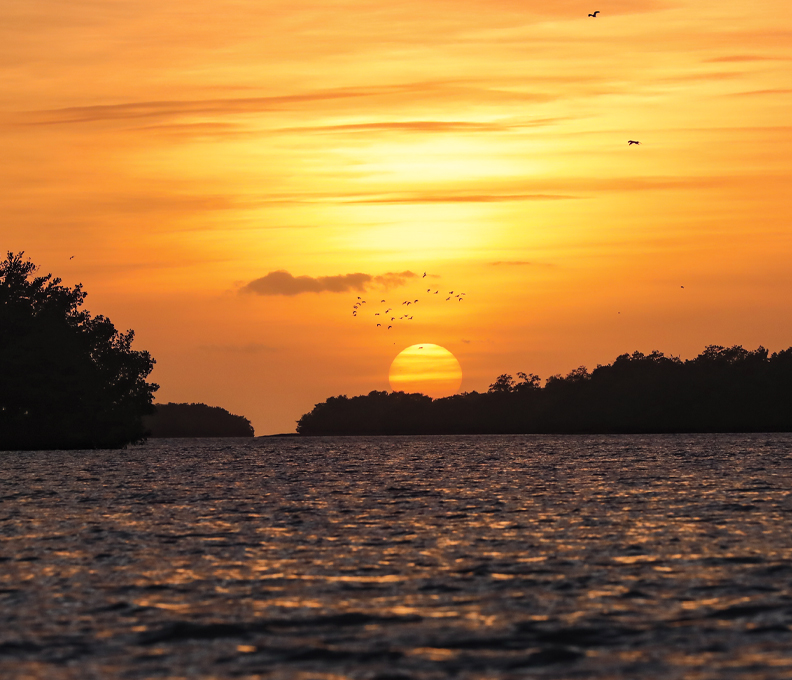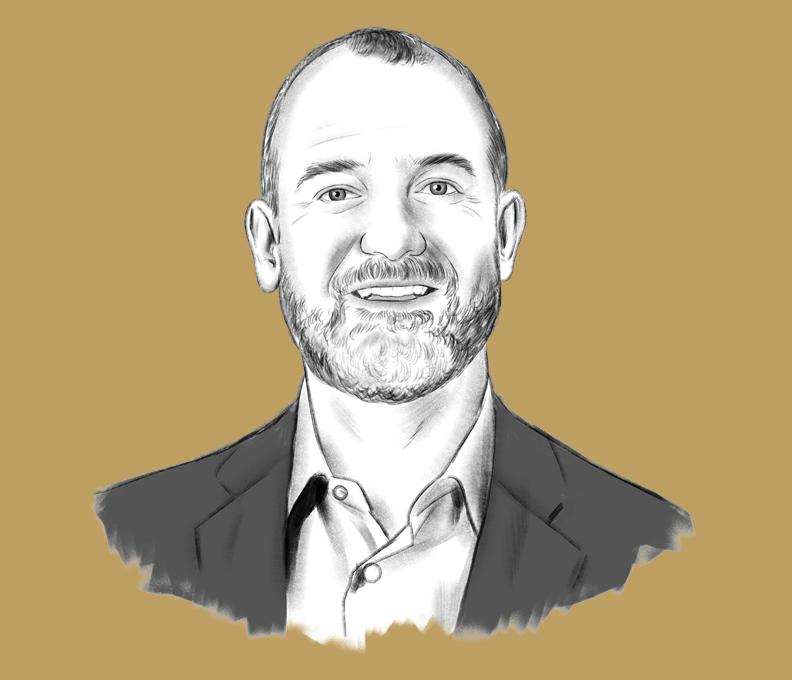Ahead of the Paris Olympics, France Looks to a Green Future
As the Olympic Games return to the French capital, a host of eco-forward companies and projects are revolutionizing the region’s economy
by Boyd Farrow
April 19, 2024

Olympic Games / Photo: Courtesy of @Paris2024
He cannot promise that President Macron will make a James Bond-like entrance, landing on a floating pad on the River Seine. But Lionel Grotto, CEO of Choose Paris Region—a support agency for foreign start-ups—is confident that when the 2024 Paris Olympics gets underway in the French capital, the world’s first electric flying taxi service will make a global splash.
According to Grotto, the fleet of air taxis is the perfect symbol for France’s soaring aspirations. “Making a commitment to this new era of urban air mobility is good for the economy and the environment, but it also sends a message to overseas companies that this is a country that backs innovation,” he says. “Plus, the aircraft look pretty cool, too.”
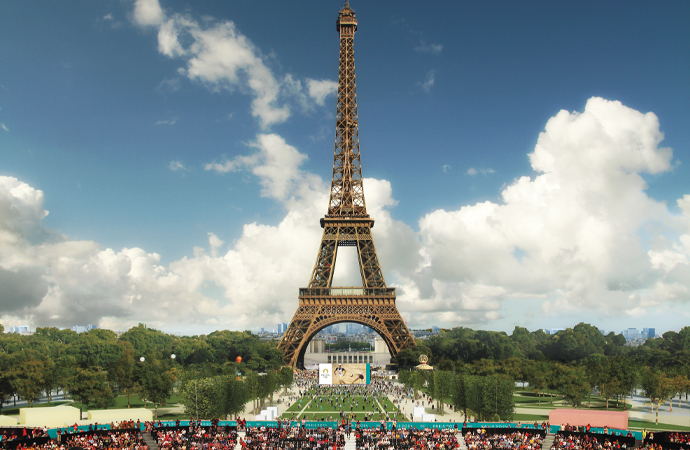
Eiffel Tower Stadium / Photo: Courtesy of @Paris2024
Some 16 million people are expected to visit Paris this summer for what will be the first Olympic Games to be held there in a century. Naturally, the French are planning quite a show.
The longest-ever opening ceremony will include a four-mile parade on the Seine, while every Parisian landmark will make a glittering cameo during the tournament. The Eiffel Tower will serve as a backdrop for triathlon events. The Place de la Concorde will become a skateboard arena. The Grand Palais will stage the tae kwon do. If all this isn’t fancy enough, the equestrian events will be held at Château de Versailles.
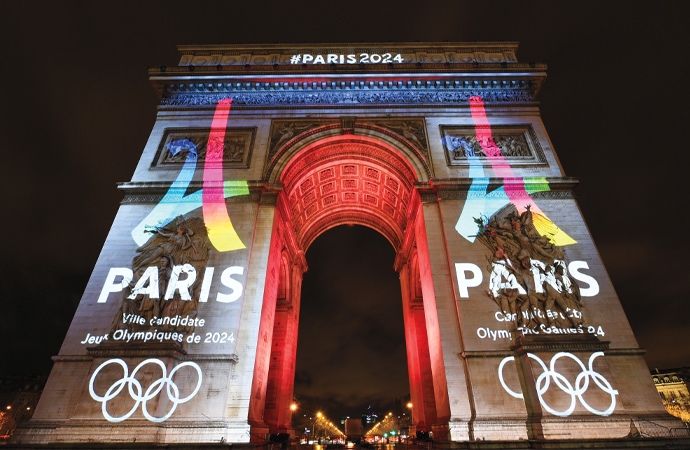
Olympic Games logo on the Arc de Triomphe / Photo: Courtesy of @Paris2024/PhilippeMillereau/kmsp
Host countries usually view the Olympics as a way of growing visitor numbers, boosting local businesses and promoting exports. France, though, has far larger ambitions, seeing the event as a springboard to generating $16 billion in economic benefits and creating more than 250,000 jobs in the Paris region. Moreover, hosting the games is part of a bigger strategy to make France a leader in sustainable tourism and turn the City of Light into Europe’s greenest metropolis by 2030. Headline-grabbing projects designed to help combat global warming, boost biodiversity and improve air quality in Paris include the $270 million transformation of the mile-long Champs-Élysées into an “extraordinary garden” and the creation of four “urban forests” next to major landmarks such as the Hôtel de Ville and the Opéra Garnier.
But many other climate-related initiatives have been implemented with less fanfare. In an effort to reduce nonessential air travel, France banned all short-haul domestic flights between cities that are linked by a train journey of less than two and a half hours. The procedure for awarding stars to hotels now involves 27 criteria related to sustainability. And in an effort to reduce waste, single-use tableware has been banned from every fast-food restaurant.
Although the prospect of millions of extra visitors may seem at odds with this green fervor, Corinne Menegaux, director-general of Paris’ tourist and convention bureau, insists that the games—awarded by the International Olympic Committee (IOC) in 2017—have been a catalyst for several major projects designed to help achieve a carbon-neutral future. “The summer 2024 deadline has definitely accelerated many big urban renewal programs, and it has driven innovation and investment in all sorts of areas, particularly mobility, waste management and energy consumption,” says Menegaux. “This has also laid the foundation for a more sustainable tourism industry, which can benefit the entire country for many years.” In the meantime, she says, the widespread dispersal of the Olympic events means the whole Île-de-France region—which includes the city of Paris and its surrounding areas—benefits from the tournament. Paris may be the world’s top destination—welcoming more than 40 million visitors in a typical year—but a fair number of those attending the Olympic Games (July 26 to August 11) and Paralympic Games (August 28 to September 8) will be venturing out of the gilded 8th Arrondissement for the first time. According to Menegaux, many artisanal businesses also stand to gain, thanks to the Fabriqué à Paris label, introduced in 2017 to endorse and raise the visibility of sustainably made local goods. “So far, more than 2,000 products, from food to fashion, have been awarded this label,” she says. “As well as guaranteeing high quality and authenticity for Parisians and tourists, Fabriqué à Paris promotes companies that have a positive impact on the environment and society.”
Significantly, the 128-acre Olympic Village is part of a colossal regeneration scheme in Seine-Saint-Denis, a deprived suburb five miles north of the city center. It will be linked to Paris by the $38.5 billion Grand Paris Express rail network—Europe’s largest transport infrastructure—which will eventually loop the whole city, connecting 68 new underground stations, and almost double the size of the Métro system. It is envisaged that up to 400,000 residences will proliferate around these new stations. Indeed, according to the Société du Grand Paris, the public body tasked with delivering the Grand Paris Express, once the whole network is operational it will generate an additional $110 billion in GDP and more than 115,000 jobs on top of those created by the region’s natural growth.
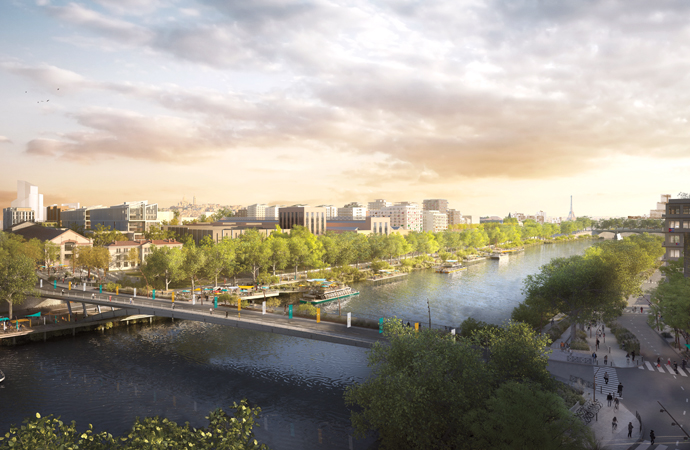
Olympic Village in Seine-Saint-Denis / Photo: Courtesy of Solideo/Antonin Ziegler
Paris is certainly enchanting foreign investors. A recent Choose Paris Region report reveals that 2022 was a record year, with overseas companies backing a total of 431 projects—up seven percent on 2021—and creating 30,000 jobs. Moreover, Île- de-France topped fDi Intelligence’s 2023 rankings of Large European Regions of the Future.
Grotto notes that the majority of the new jobs are in innovative or “high-value” sectors. “We have seen that since 2017 many international businesses have used the Olympics as a spur to invest in infrastructure projects, which encompass hospitality, transport, energy, IT and data sectors,” he says. “At the same time, a lot of the foreign companies setting up start-ups in the Paris region are transitioning to emerging green technologies and recognize the big opportunities here.”
Toyota Motor Corporation, for instance, partnered with three French companies to create HysetCo, which aims to accelerate the rollout of zero-emission hydrogen mobility. HysetCo recently opened Europe’s largest hydrogen refueling station for light vehicles in Paris, where the Japanese company is already an investor in Hype, the world’s first fleet of hydrogen-powered taxis.
Yet, according to Grotto, it is American companies making the biggest inroads. “Of all the new jobs created in the Paris region in 2022, 42 percent came from U.S. firms, compared to an average of 34 percent over the last four years,” he says. “Going forward, this figure is likely to be higher.”
This is largely due to Paris’ concerted efforts to replace London as the leading finance capital of Europe, following the U.K’s vote to leave the European Union. Required to find a new European base post-Brexit for regulatory reasons, most U.S. multinationals initially decamped to Frankfurt (home of the European Central Bank), Amsterdam, Luxembourg and Dublin. However, a flurry of fiscal and market reforms has made the French capital a sexier option. Consulting firm EY says that of the 7,139 jobs the Paris region had gained by January as a direct result of Brexit, 5,507 are in financial services such as banking, insurance and assets management.
The U.S.’ largest bank, JPMorgan Chase & Co., now has 860 employees in the French capital, following the transfer of nearly 500 London jobs. Bank of America and Goldman Sachs, which both employed just 70 people in Paris before Brexit, have workforces exceeding 650 and 400, respectively.
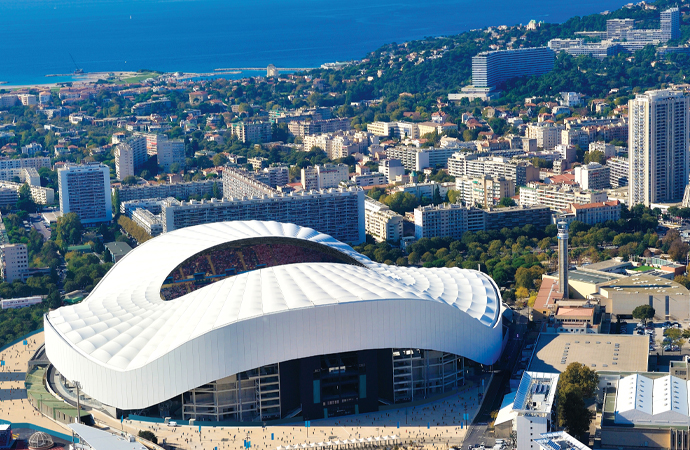
Marseille Stadium / Photo: Courtesy of @Paris2024/Golem Images
Grotto believes the Paris region will further benefit as the finance sector continues to evolve. For instance, JPMorgan has launched a Paris-based division focused on artificial intelligence and is on a hiring spree following the announcement of its new ChatGPT-like bot, IndexGPT.
To capitalize on this surge in transatlantic businesses, Air France has embarked on a major strategic program to bolster its North American routes. The flag carrier has increased capacity, operating up to 212 weekly flights to 21 cities in the U.S., Canada and Mexico. One eye-catching new destination is Raleigh, capital of North Carolina and part of the Research Triangle, one of the U.S.’ leading high-tech R&D hubs and second only to Silicon Valley for advanced industries.
The airline has also launched its much lauded Business-class seats on its Paris to New York-JFK route. These are also available on direct flights from Paris to LAX—a timely development for the IOC bigwigs already working on the 2028 Summer Olympics in Los Angeles.
